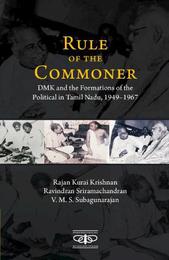
|
Rule of the Commoner: DMK and Formations of the Political in Tamil Nadu, 1949-1967
Hardback
Main Details
Description
The Dravida Munnetra Kazhagam (DMK) has been singular in heralding and establishing a firm regional polity among the Indian states after the Indian Union was inaugurated as a republic. Academic scholarship has often treated the DMK as a Tamil nationalist or ethno-nationalist formation without conceptual clarity or critical insight. Rule of the Commoner demonstrates with persuasive evidence that the DMK appealed to a federalist and not nationalist imagination. The DMK's combining of the non-Brahmin Dravidian identity and allegiance to Tamil language led to a counter hegemonic formation of the plebes and left populism. Drawing on Ernesto Laclau, the book argues that the DMK achieved the construction of a people as Dravidian-Tamil, with Tamil being the empty signifier of the social whole, Brahmin vs. non-Brahmin divide functioning as the internal frontier leading to the formations of the political. It elaborates the conceptual scheme under the three rubrics of Ideation, Imagination and Mobilization.
Author Biography
Rajan Kurai Krishnan is Associate Professor at the School of Culture and Creative Expressions, Dr B R Ambedkar University, Delhi. He regularly publishes articles on political theory, philosophy, global affairs, climate change and film theory. Ravindran Sriramachandran is Assistant Professor of Sociology and Anthropology at Ashoka University. His research interests include semiotics, environment and development, South Asian politics, and film studies. VMS Subagunarajan is an independent researcher in Chennai. He has written extensively on the Dravidian movement, especially on Periyar.
Reviews'In this original and important study of a major leader in the Dravidian politics of south India in the middle of the twentieth century, the authors make a vital distinction between the rhetorics of 'people' and 'nation', to show that far from being a mere example of regional chauvinism or separatism, Annadurai's vision was a genuine alternative to the reigning forms of nationalism in Nehru's India.' Arjun Appadurai, author of Banking on Words: The Failure of Language in the Age of Derivative Finance 'This is the most comprehensive analytical account of the Dravidian movement in English. In the course of a gripping narrative, the authors draw an intricate picture of the complex relations between Periyar, Annadurai, and Karunanidhi as well as the split between the DMK and AIADMK. We have here a powerfully told story of how the DMK shaped the Tamil people into a political entity.' Partha Chatterjee, author of The Truths and Lies of Nationalism as Narrated by Charvak 'With infinite care and unfaltering speculative ambition, Rule of the Commoner rises from the sea like Proteus: cultural critique but also political theory, political sociology but also electoral analysis, the book inaugurates a new and powerful idiom, a new sapience in political philosophy. Plotted against the double horizon of immanence and transcendence, this is an allegory of how the infusion of the social into the political relentlessly individualizes and singularizes the mass, but always from within a warm ethical fold through which glints the sunny humanity of the DMK in its world-historical moment of mass mobilization.' Milind Wakankar, author of Subalternity and Religion: The Prehistory of Dalit Empowerment in South Asia
|